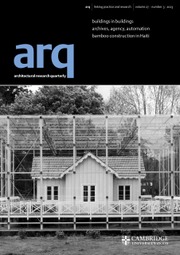No CrossRef data available.
Research and design in academia
Published online by Cambridge University Press: 26 September 2001
Abstract
In Peter Hall's introduction to Leslie Martin's ‘The Grid as Generator’ (arq 4/4) he states that ‘the crucial link between research and design has been fatally lost’ and that ‘it is more than high time that architecture schools begin to rediscover it’. I am not so sure Hall is correct in saying that the link has been broken, though the parameters may have changed since Leslie Martin's day. Martin's work was set in the context of post-Oxford Conference architectural education and research, with its alliance to the models of the sciences and objective analysis. The link between research and design could then be identified as an instrumental one, with the former directly guiding the latter along prescriptive tramlines. The intellectual strength of such methodological approaches may be apparent, and to some extent they fulfilled the Oxford Conference's mission of saving architecture within the elite academies. But there are also dangers in the determinist use of research to direct design.
- Type
- letters: Leslie Martin's ‘Grid as generator’: Sustainability responsibilities
- Information
- Copyright
- © 2001 Cambridge University Press




